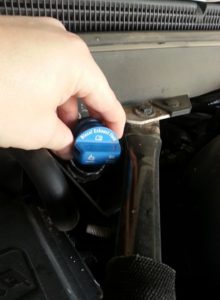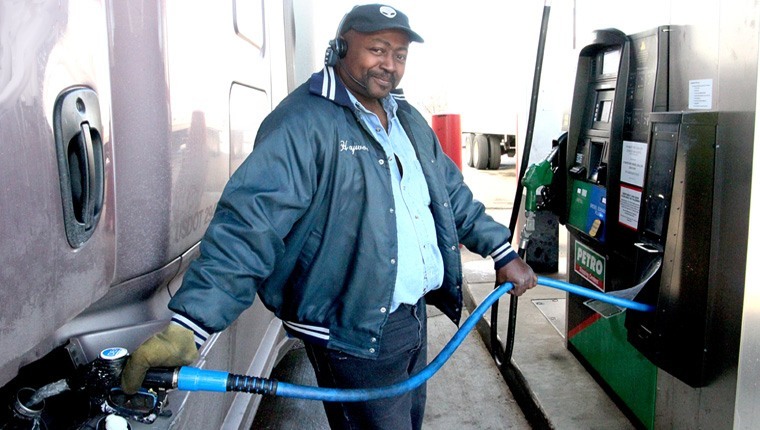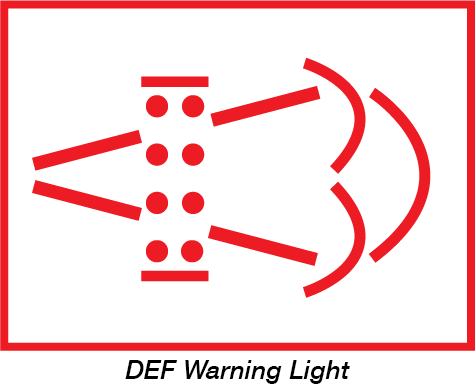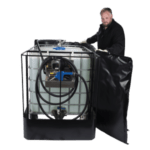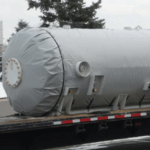Diesel Exhaust Fluid (DEF)
DEF is a key factor in making sure our trucks run smooth, efficient and clean on America’s highways. This liquid is used in nearly all diesel-fueled vehicles in the United States, from pickup trucks to ambulances to 18-wheelers. With something so commonplace, you’d think that most people have heard of DEF. But that’s not the case. Do you know what DEF is? Join Powerblanket as we explore DEF in why it’s important, how it’s used, and what to look out for so you use it correctly.
What is it?
DEF is a mix of synthetic urea and deionized water. Urea is naturally found as a byproduct in urine, but urea in DEF is created in a laboratory. (On that note, it’s a good opportunity to mention that if you run out of DEF, under no circumstances should you urinate in your DEF tank. But more on that later.)
DEF is most often seen as a clear, odorless liquid. When it dries, it solidifies into white crystals.
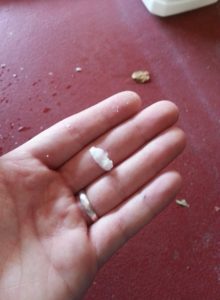
Why is it Important?
DEF is a critical part of the diesel exhaust system in combustion engines. The Environmental Protection Agency has been limiting nitrogen oxide emissions since 1994, with additional reductions in 1998, 2002, 2007, and 2010. According to the web-based science, research, and technology news service www.phys.org, “Nitrogen oxides (NOx) are poisonous gases derived from nitrogen and oxygen combustion under high pressure and temperatures…[it] can cause breathing problems, headaches, chronically reduced lung function, eye irritation, loss of appetite and corroded teeth. Indirectly, it can affect humans by damaging the ecosystems they rely on in water and on land—harming animals and plants. In Britain alone, known NO2 emissions have been estimated to kill 23,500 people every year, according to aerosol science professor Ian Colbeck of the University of Essex, southeastern England.” The World Health Organization classified NOx as being a cause of cancer in 2012.
NOx diesel exhaust fumes also emit particles that are too fine for human lungs to filter, which can harm one’s ability to breathe in ways such as asthma and other chronic breathing problems. Those same particles are also causes of lung cancer and, according to www.phys.org, “premature death in people with heart or lung disease.”
Before the 1990s, exhaust systems were not regulated. Beginning in 1994, diesel regulations limited the amount of NOx pollution released by diesel-fueled vehicles. Since then, DEF has become a staple in virtually all diesel trucks on American roads in their Selective Catalytic Reduction (SCR) system, where exhaust is treated in the exhaust system instead of the engine itself. As the exhaust leaves the engine, a mist of DEF is sprayed into the exhaust. The two mixes into ammonia and NOx, which then goes through the SCR catalyst, which changes both into nitrogen and water vapor. This final result is harmless.
Applications of DEF
Nearly all diesel-fueled vehicles in the United States use DEF. This includes ambulances, fire trucks, and wildland firefighting engines. Powerblanket met with the Madison Fire Department in Rexburg, Idaho, to discuss the uses of DEF within its firefighting fleet.
In Rexburg, winters can drop outdoor temperatures well below -20°F. In order to make sure the temperature doesn’t affect DEF quality, all Madison Fire Department vehicles are equipped with internal heating devices to ensure DEF does not freeze. Several vehicles, such as the ambulances and pickup trucks, have internal DEF tanks equipped with heaters.
Standard fire engines and wild land fire engines, on the other hand, use external DEF tanks.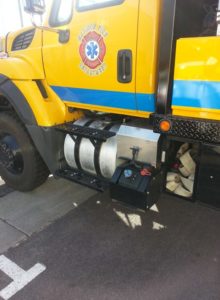
The U.S. Military also has a large vehicle fleet that consumes diesel fuel. However, DEF is not commonly used in bases across the world. With the exception of vehicles used for local travel, heavy-duty vehicles such as tanks and work trucks are exempt of NOx reduction regulations. This is due in large part for lack of high quality, low sulfur diesel fuel in places such as Iraq and Afghanistan, whereas jet fuel, that has a high sulfur content that would quickly clog filters that use DEF, is plentiful.
In the U.S. Military, being able to take a tank brigade and armored truck division out of Louisiana and send them into combat zones across the world is paramount. Using jet fuel, which negates the need for DEF, is essential to that mission.
DEF Pump Stations on the Rise
As federal government regulations increase the demand for quick access to DEF, gas stations are rising to meet that need, particularly those that cater to long-haul truckers. DEF refilling pumps can be most often seen next to diesel fuel pumps. Such pumps are clearly labeled with “DEF” on them, and most DEF tanks are fitted to not allow diesel fuel to be accidentally pumped in.
A Word of Warning
DEF is probably one of the least dangerous chemicals in your vehicle, though that doesn’t mean it should be treated lightly. There are a few things to keep in mind that will help you maximize the effectiveness of DEF:
- Running out of DEF: When your vehicle is low on DEF, a warning light will come on to alert the driver that if the DEF tank is not filled soon, the vehicle’s performance will undergo a sudden change. When the DEF tank is completely empty, the vehicle will slow to a maximum speed of a mere five miles per hour. This is so the vehicle is preserved until the DEF is refilled. Once the DEF tank has been replenished, vehicle performance will resume as usual.
- DEF expires: DEF has a very short shelf life. In fact, purchasing DEF that has been sitting on the shelf for more than a year and pouring it into your exhaust system will cause damage to the vehicle. If stored away from sunlight and between 10°F and 90°F, DEF’s shelf life can last up to a year.
- How do you know if your DEF is expired? All DEF containers that are purchased at automotive supply shops have an expiration date on the package, not too dissimilar from food expiration dates. DEF pumps at gas stations do not have a labeled expiration date due to the constant cycling of DEF into the pump.
- Never mix: Though DEF itself is also harmless–spills can be simply wiped up with a rag–it should never be poured into the fuel system. In addition, other liquids, such as additives, should never be added to the DEF tank.
- Some people think that because DEF is made up partly of urea, it’s acceptable to urinate into their DEF tank when they’re low on DEF. This is not true. DEF uses a synthetic urea not derived from biological sources, and is made to have a highly purified solution of urea. Agricultural urea fertilizers should also never be poured into a DEF tank.
- Keep it heated: DEF freezing in your truck will not damage the SCR system. Operating a vehicle with frozen DEF is fine, but less effective than if it was thawed. Many vehicles use internal heating equipment or the engine heat itself to keep DEF thawed enough to use. However, if DEF is stored in bulk in an external tank, a heating source will be required. Keeping DEF at a regular temperature between 10°F and 90°F is critical to ensure quality DEF. Make sure you’re using high quality and efficient DEF tank heaters as your residential, commercial or agriculture heating solutions.
DEF is an important part of diesel-fueled vehicles. Though not part of the drive system, DEF is essential to making the world a better place by lowering vehicle exhaust and smog. It’s a key part of the trucking industry, and will continue to be as the EPA’s NOx regulations are in place.
For more information about Powerblanket’s DEF tank heaters, call 844.224.5915 or email us at [email protected].
Frequently Asked Questions
What happens if you use expired DEF?
Using expired DEF can lead to corrosion and permanent damage to diesel engines, so it's crucial to check expiration dates and store DEF properly to maintain its effectiveness.
How do you know if DEF is bad?
You can tell if DEF is bad by its appearance; it should be clear and free of contaminants, so if it appears cloudy or discolored, it is likely expired or contaminated.
How long does it take for DEF fluid to go bad?
DEF typically lasts up to a year when stored between 10°F and 90°F, but its shelf life can extend to 18 months if kept cooler.
Does BlueDEF have a shelf life?
Yes, DEF, including BlueDEF, has a shelf life that can last up to two years if stored between 12°F and 86°F, and freezing does not affect its efficacy once thawed.
The Powerblanket DEF tank heater is the most efficient and effective way to heat and store diesel exhaust fluid.


